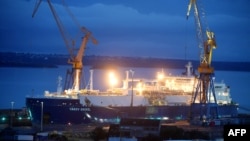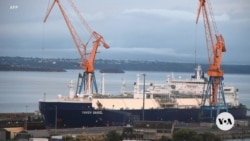European shipyards are providing vital servicing contracts to vessels carrying Russian liquefied natural gas, sustaining a trade that Kyiv says is funding the Kremlin’s war on Ukraine.
Meanwhile, a new analysis of the latest trade data shows that imports of Russian LNG to the EU rose last year, bucking the overall trend of declining imports from the rest of the world.
A fleet of 15 specialized Arc7 tankers carry Russian LNG from its source on the Yamal Peninsula, high in the Russian arctic, to import terminals in Europe and beyond.
The vessels are designed to smash through the arctic ice, allowing Moscow to ship its lucrative LNG year-round. The demanding conditions mean that the tankers require regular repairs.
Satellite tracking data show 14 of the vessels are being serviced at two European ports: the Damen shipyard in Brest, France, and the Fayard A/S shipyard near Odense, Denmark.
“The European shipyards … are pretty much right along the natural export-import route that they're going along anyway. So, it's pretty convenient to stop there for a week or 10 days to do the hull maintenance, repainting, et cetera. For Russia, if those European shipyards would be off limits, the operation would definitely peter out over several years as the vessels would become more and more unusable,” said Malte Humpert, a senior fellow at The Arctic Institute and an expert on LNG shipping.
Western expertise
Western expertise appears crucial in keeping the tankers operational. A single Arc7 vessel, the Christophe de Margerie, is subject to Western sanctions and can no longer call at European shipyards. Attempts to repair the ship in China appear to have failed, and it is currently out of action.
Even if other servicing facilities were found, the LNG trade might not be profitable, Humpert said.
“A large part of the economics is to have the shipyards very close to where you offload the gas. The operating costs are up to $100,000 per day for those vessels. So if suddenly you lose a journey from Europe to China, that's several weeks. If you lose weeks and weeks, that's millions of dollars you lose in terms of operating costs,” he told VOA via Zoom.
There is no suggestion that the European shipyards – Damen in France and Fayard A/S in Denmark – have broken any EU sanctions. Damen told Britain’s Financial Times that no further servicing of the Arc7 tankers was planned “for the coming period.” Fayard declined to comment.
Imports rise
The servicing is being carried out despite European pledges to stop buying Russian energy, following Moscow’s 2022 full-scale invasion of Ukraine. Kyiv says the profits fund the Kremlin’s war.
Before 2022, Russia supplied about 40% of Europe’s gas. Most European countries no longer receive Russian gas via pipelines after Ukraine refused to renew a transit agreement with Moscow at the beginning of the year.
It’s a different story for liquefied natural gas transported by sea. A new analysis shows LNG imports from Russia rose by 18% last year, bucking the overall trend of declining imports from the rest of the world.
Market forces
Ana Maria Jaller-Makarewicz, who co-wrote the European LNG Tracker report for the Institute for Energy Economics and Financial Analysis, said market forces dictate LNG trade patterns.
“The main suppliers decreased their exports to Europe: the U.S., Qatar. But we saw an increase in Russian LNG. So then we started thinking: What's going on? What is happening there?”
“Yamal [in Russia] has contracts with certain companies in Europe, so we see lots of companies involved in all this trade. The issue is that [the European Union] could say something, but these are commercial agreements. These are private companies. It's just business. ... They will try to secure LNG where it's best for them,” Jaller-Makarewicz told VOA via Zoom.
For some European countries, that business is worth more than the aid they’re sending to Ukraine, Humpert said.
“Spain imported $2.5 billion of LNG from Russia last year, and they spent $500 million in military aid,” he said, adding that many of the tankers carrying Russian LNG are owned and insured by European companies.
“If the EU were to sanction them, then that definitely cuts into European companies' profits and there’s definitely losses. I mean, that’s always what you have to weigh up, right? Sanctions do cause economic harm,” he said.
EU ban
The EU so far has stopped short of banning Russian LNG imports. Officials told Reuters last month that the bloc wants to secure alternatives before taking any measures against Moscow.
“First you have to have a deal, because otherwise you will be left without gas from Russia and without the U.S.," an unnamed EU diplomat told Reuters.
European pledges to cut down on Russian energy imports are being undermined by the LNG trade, said analyst Jaller-Makarewicz. While some LNG importers are tied to long-term contracts, “around 30% are done on spot rates,” she said.
“In 2022, Europe said, 'We definitely need to stop our dependency on Russian gas as a whole.' LNG from Russia was not a major factor at that moment; it was the gas coming via pipeline. So then why are we still buying on spot rates that are not really based on LNG long-term contracts?” she asked.
An EU ban on the transshipment of Russian LNG to countries outside the bloc is due to come into force later this year.






